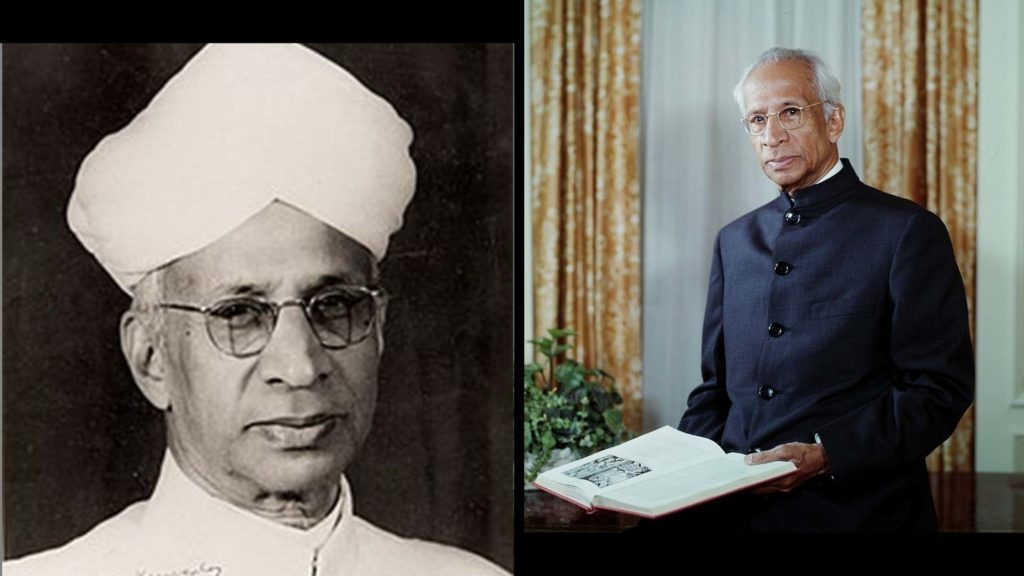Sarvepalli Radhakrishnan is one of the few political leaders of modern India who was acclaimed as a philosopher and intellectual. He defied the first simple classification that dominated post-colonial Indian historiography.
About Sarvepalli Radhakrishnan
While it would have been easy to have him fit into one category or the other. He belonged in all of them. An educator who was recognized for his scholarly contributions to ancient and modern India’s history and culture. A scholar who produced significant works on linguistics, comparative religion, metaphysics, ethics, and aesthetics. A historian whose interests ranged from ancient Greece to Mughal India. An outspoken commentator on international affairs – yet always with reference to India; and finally, a statesman during challenging times in world history.
This essay is an attempt to delineate the contribution that Radhakrishnan made as an educator by studying his efforts to integrate the ideals of education with his life and work.
In this light, Radhakrishnan’s academic work as a professor of philosophy at Oxford, his term as vice-chancellor of Andhra University, his activities as president of Indian Philosophical Congress, and the Bharatiya Vidya Bhavan and, later, chancellor of Benares Hindu University become part of an overall scheme. In addition to these formal positions, he was also a lecturer at Banaras Hindu University and Jamia Millia Islamia for several decades. These activities constituted another integral part of his role as an educator.
Early Life
Birth of great
Sarvepalli Radhakrishnan was born in a Telugu Brahmin family in Tiruttanjapuram, Madras Presidency on September 5, 1888. He born with a silver spoon. He named Sarvepalli because the locality in which he lived was part of the Sarvepalli estate owned by his paternal grandfather.
Radhakrishnan’s mother, Vaiyammal, was a devout woman who made sure that Radhakrishnan had all that he needed to pursue his studies, whether time or money. She would never allow her son to take up any job for financial reasons.
Complete his Study
Despite his mother’s wishes that he complete his education, Radhakrishnan chose to become a lecturer at the age of seventeen. He believed that he would not have time to pursue his own interests once he started earning money.
Radhakrishnan studied first at Madras Christian College and then at the Madras Presidency college (later Christian college). He excelled in philosophy and literature and stood out among other students with his quick intelligence, deep thinking, and ability to grasp new ideas. In 1910, while still a student, Radhakrishnan wrote a letter to The Hindu where he expressed his opinion on the role of language in history.
Personal life and marriage
Radhakrishnan also married that year. His first love girl named Prakashamma, who had been courting him for a long time. They both wanted to study philosophy at Oxford but could not because of their financial situation.

Radhakrishnan’s marriage eventually dissolved in an acrimonious divorce, the subject of which has been documented in many biographies and letters written by Radhakrishnan to his former wife. The couple did not have any children.
Radhakrishnan always believed that people should have an ideal family life. His first marriage, however, was a dismal failure and made him realize the importance of a settled life.
Early career in India
Radhakrishnan joined the government service after graduation in 1910. He was part of the colonial Indian bureaucracy for twenty-two years. Radhakrishnan held several important posts in the government service. He especially praised for his work on linguistic studies.
Pursuing a career in scholarship helped Radhakrishnan to overcome his personal loss at some point during the early years of his marriage with Prakashamma. The ideological differences between them gave him time to pursue his intellectual interests alone.
In addition to his work as a civil servant, Radhakrishnan also had the opportunity to pursue his scholarly interests. He held academic positions at Banaras Hindu University and Jamia Millia Islamia. He also involved in many other activities such as editing several journals and writing textbooks.
Political Career
Radhakrishnan’s rise as a political leader took place after he joined politics in 1922. In spite of the fact that Radhakrishnan had no interest in politics. He drawn into it after the death of Lokmanya Tilak in 1920. In 1924, Radhakrishnan became the president of the Indian National Congress for two years under Gandhi’s influence and guidance. Radhakrishnan’s use of the word ‘socialism’ in an article written in 1925, made him unpopular with the British authorities. Therefore he pressured to take a political retirement in 1926.
After his retirement, Radhakrishnan became an adviser to Mahatma Gandhi and an inspiration for other Indian leaders such as Nehru and Sardar Patel. After being elected as the vice-chancellor of Andhra Pradesh University in 1940. He worked towards unifying Telugu Brahmins and Reiyangnam chiefs under a common minimum agenda.
Getting awards
He received many awards, including Bharat Ratna in 1954, Padma Vibhushan in 1954, and Padma Bhushan in 1972. He was also the first non-European to have received the Nobel Prize for literature in 1978.
The paper will discuss how Radhakrishnan integrated his life and work into an overarching philosophical system. It will cover his academic career at Oxford University and Indian Philosophical Congress as well as his early life and personal life.
The Paper will also include his role as a founding member of Bharatiya Vidya Bhavan from 1946 to 1949. Later as its president from 1950 to 1952.
He got many awards from foreign countries also such as Knight Bachelor from British India in 1931. In 1954 Germany awarded him the Pour le Mérite for Sciences and Arts. In the same year, Mexico awarded him with the Order of the Aztec Eagle. The United Kingdom also awarded him the Order of Merit in 1963.
Teacher’s day
A memorial to Sarvepalli Radhakrishnan was established by the Government of India on the occasion of his 100th birth anniversary in 1971. This done in tribute to his invaluable contribution to Indian culture, education, and politics.




